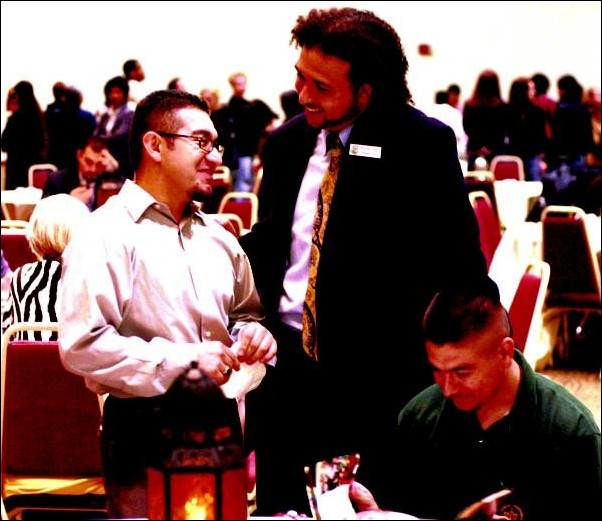Ramadan celebration brings campus muslims together
Image: Ramadan celebration brings campus muslims together:Mohamed Hamada, “Fast for a Day” organizer, and former ASI President Eric Guerra talk during the Muslim Student Association event on Tuesday night.Photo by Sean Hogan/State Hornet:
October 28, 2005
Ramadan is about using the spirituality of the month to exchange ideas and connect with one another on a human level, said M.A. Azeez, the event keynote speaker at the Ramadan festivities Tuesday night in the University Union Ballroom.
The Muslim Association sponsored event invited Sacramento State students to “Fast for a Day” and take part in Ramadan, the holy month that Muslims observe every year.
The community celebration of the Muslim ritual includes refraining from eating, drinking, smoking and sex for 30 days from dawn to sunset Azeez said.
Several hundred people attended the annual event and ate traditional Indian food at lantern-lit tables sprinkled with rose petals.
Before eating dinner, guests were invited to watch the sunset prayer and eat dates, a tradition that was set forth by the Islamic prophet Mohammed.
Mohamed Hamada, event organizer and former president of the Muslim group said, “This is the one chance where we get to share this enjoyment with other people.”
Hamada said that Ramadan is a social month where family and friends get together and celebrate. It is also a time of inner reflection and self betterment, Hamada said. During Ramadan, even the simplest things in life, such as food and water, are not taken for granted.
As one of five pillars of faith that Muslims must follow, fasting is about developing a standard of moral character and becoming a pious, patient person, Azeez said.
“When Muslims refrain from the permissible, they gain power and strength to avoid the impermissible,” Azeez said.
Other elements of Ramadan, Azeez said, are the tightening familial bonds and reaching out to the community. Many events akin to Tuesday’s are happening around the world during Ramadan, Azeez said.
Charity, the last element of Ramadan, prompts Muslims to donate money to the poor in the community. Muslims are able to endure what the poor must go through by feeling the pangs of hunger and thirst during the day.
The month is an opportunity for non-Muslims to reach out and understand Islam ?” to look at the religion with fresh eyes, Azeez said.
“When you put a face on a Muslim, that person becomes your friend and you will block out the stereotypes,” Azeez said.
Azeez used the ancient Greek sorites paradox that stumped philosophers for over 500 hundred years, to illustrate the need for Americans reevaluate their values.
To illustrate the sorites paradox, Azeez showed a series of slides where sand particles were continuously taken from the heap of sand and given to another small pile of sand. It was evident after many repeats of this action that one mound of sand was growing and the other shrinking.
The point of the exercise, Azeez said, was to show the human tendency to overlook small changes.
The sorites paradox applies to aging, Azeez said. “Every day you see the same person in the mirror and then one day you look at pictures and you see a tremendous difference.”
“When I look at American ideals, I see equality and tolerance; freedom of religion, thought and speech ?” I see beautiful things,” Azeez said.
However, Azeez said that he’s scared that civil rights violations and racial profiling are slowly chipping away at these ideals.
“We should go out of our way to tie the bonds between us ?” that’s how we get through wars, terrorism and storms,” Azeez said.
Azeez said that Sacramento State students should care about Ramadan because it is a chance for everyone to make an effort to break down barriers and stereotypes.
Azeez answered questions at the end of his lecture about the spirituality of fasting and common misconceptions surrounding Muslims ?” that Islam produces violent extremists and that women have no rights. He said a small percentage of global terrorist acts are committed by Muslims and that women have a surprising amount of independence given to them by the Quran, the Muslim holy book.
Jeff Moulton, a Sacramento State junior majoring in psychology, stood up and told the crowd his fasting experience.
“You don’t really value food unless you don’t have it,” Moulton said. “You can’t really empathize with other people unless you deprive yourself.”
Azeez was born in Egypt and lived for 23 years in the Middle East. After obtaining his medical degree in 2000, Azeez studied Social Sciences and wrote his master thesis in violence in the Muslim tradition. Today, Azeez spends his time as director of the Religious activities at the Sacramento Area League of Associated Muslims.
This year Ramadan began on Oct. 4 and will end Nov. 2. Ramadan is the ninth month on the Islamic calendar and begins with sightings of the new moon. The Muslim lunar year is 11 days shorter than the Christian solar year, and is adjusted by adding an extra month.







































































































































